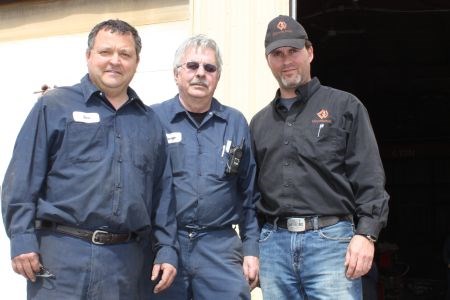For 40 years, Sudbury's City Welding has been at the forefront of ingenuity, earning a 2011 Bell Chamber of Commerce Award for its innovative approach to business. But a lack of proper infrastructure is threatening the foundation on which that business has been built.
The company, which was started in a small garage on swamp land by Georges Brouillette in 1971, has grown exponentially. Clients came to Georges with their welding conundrums and he earned a reputation for quality work that solved the most complicated challenges.
“The company is really driven by my father's ability to think outside the box,” said Robert Brouillette, Georges' son and City Welding's general manager.
Recent innovations include a 6,000-square-foot painting and sandblasting facility—one of a kind in Northern Ontario—and a state-of-the-art precision cutting table that can cut material up to 12 inches thick.
Innovation goes beyond technical solutions, however.
The business has eagerly tapped into the immigration market, and the company’s business plan and model is shared with employees.
“We really value the input of the employees, and we very much get them on board with regard to caring (about the company),” Brouillette said. “Then when we do well, we pass that along.”
But the company hasn’t been without challenges.
Sitting at the heart of the New Sudbury industrial park at the juncture of Lasalle Blvd. and Elisabella St., City Welding has also found itself at the heart of an ongoing debate over the development of industrial land in Sudbury.
Brouillette said the properties in the park lack adequate water supply and frequently flood because of water main breakage. Employees often can't use company water because of its foul odour, and Brouillette is concerned about safety, particularly in the event of fire.
Highly critical of the city's role, Brouillette said he and other business owners in the park have been waiting for four and a half years for the city to fulfill its promise to address the situation.
But the issue extends beyond problems at one business or industrial park, said Sudbury CEO Doug Nadorozny.
“It's a City Welding issue because he has a particular business need, but this is a community issue faced in a bunch of different areas in the community, particularly in older areas where standards were different and there wasn't the same emphasis on fire codes and fire flows,” he said. “Back in the day when those services were put in, it was about bringing a water line to a building so people had potable water and that's as simple as it was.”
Nadorozny said he recognizes the underserviced areas make it difficult for businesses to expand, but there are alternative solutions, such as installing a water reservoir. Some businesses have employed this option, at their own cost, because they don't want to wait for expansion.
But Brouillette contends it's the city's job to bring services to the lots, since the businesses pay high property taxes.
Change may be on the horizon. Following the release of a report in June that outlines the challenges and opportunities for growth in eight areas of Sudbury, the city has decided to go ahead with upgrades, but it comes with an estimated price tag of $65 million.
Priority has been given to the Lasalle/Elisabella park, at an estimated cost of $7.56 million, and the Fielding Road park, with an estimated cost of $41 million.
“The problem is so huge and the money that's going to be spent is so significant, that it's unrealistic that we'll start to work on all eight,” Nadorozny said. “So what we're trying to do is say, where's the biggest pressure, where are the lowest costs, and where can we make those two factors work and make sure there's available land.”
Brouillette is “cautiously optimistic” that the plan will go forward as indicated, but retains some concerns. He worries about timelines, and questions why businesses have yet to see the cost-sharing formula.
The frustration has caused him to consider relocating the business, but the issue for him is about more than financial gain.
“It's our people, our families, our customers—it's my hometown,” Brouillette said. “It's not about business. If I want to go make money, I'll go make money. It's not about the money for me.”
Nadorozny said now that the city has committed to upgrading, and is actively pursuing funding, businesses like City Welding will see results.
“(The issue is) being positioned in a whole different light,” he said. “Now it isn't just part of a whole huge infrastructure gap—bad roads, bad pipes, bad everything. It's actually in a more defined space and one that's going to get better attention. So while (Brouillette) may not see it yet, I think it's a real step forward for areas like this where there's a pre-existing problem."




